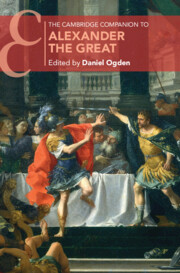Book contents
- The Cambridge Companion to Alexander the Great
- Cambridge Companions to the Ancient World
- The Cambridge Companion to Alexander the Great
- Copyright page
- Dedication
- Contents
- Figures
- Tables
- Maps
- Abbreviations
- Notes on Contributors
- Acknowledgements
- Introduction
- Part I Alexander’s Life and Career
- Part II Contexts
- 9 Macedonia
- 10 Kingship
- 11 Court and Companions
- 12 Changes and Challenges at Alexander’s Court
- 13 The Women of Alexander’s Court
- 14 Religion
- 15 Army and Warfare
- 16 Alexander’s Modern Military Reputation
- 17 Finance and Coinage
- 18 The Administration of Alexander’s Empire
- 19 Geography, Science and Knowledge of the World
- Part III The Historical and Biographical Tradition
- Part IV The Ancient World’s Memory of Alexander
- Alexander’s Timeline 356–321 BC
- References
- Index
- Cambridge Companions to the Ancient World
16 - Alexander’s Modern Military Reputation
from Part II - Contexts
Published online by Cambridge University Press: 04 January 2024
- The Cambridge Companion to Alexander the Great
- Cambridge Companions to the Ancient World
- The Cambridge Companion to Alexander the Great
- Copyright page
- Dedication
- Contents
- Figures
- Tables
- Maps
- Abbreviations
- Notes on Contributors
- Acknowledgements
- Introduction
- Part I Alexander’s Life and Career
- Part II Contexts
- 9 Macedonia
- 10 Kingship
- 11 Court and Companions
- 12 Changes and Challenges at Alexander’s Court
- 13 The Women of Alexander’s Court
- 14 Religion
- 15 Army and Warfare
- 16 Alexander’s Modern Military Reputation
- 17 Finance and Coinage
- 18 The Administration of Alexander’s Empire
- 19 Geography, Science and Knowledge of the World
- Part III The Historical and Biographical Tradition
- Part IV The Ancient World’s Memory of Alexander
- Alexander’s Timeline 356–321 BC
- References
- Index
- Cambridge Companions to the Ancient World
Summary
Alexander continues to be a subject of military as well as historical or cultural interest. In modern times, he began as the greatest of Great Captains, then became the inventor of modern mobile warfare, the model for romantic military genius, and, in recent decades, the unlikely precedent for leaders as different as Hitler and Mao Tse Tung. The writers promoting him include both Clausewitz and the contemporary Israeli writer, Martin Van Creveld; his detractors include Frederick the Great of Prussia and the most influential modern British military writer, B. H. Liddell-Hart. Machiavelli, Montaigne, and Montesquieu are among the civilians who join military men in giving opinions of Alexander as both a strategist and a fighter of battles. This chapter begins, however, with Julian, whose dialogue, Caesares, is the first extended comparison of great generals in the Western literary tradition. From there it moves to Machiavelli and thence to Italian as well as French writers, before going on to recent literature dominated by writers in German and English. The chapter ends with speculation as to why Alexander remains an authoritative yet iconoclastic figure in military history.
- Type
- Chapter
- Information
- The Cambridge Companion to Alexander the Great , pp. 256 - 272Publisher: Cambridge University PressPrint publication year: 2024

